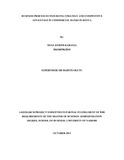| dc.description.abstract | The purpose of this study was to investigate the effect of business process outsourcing
strategy and competitive advantage in commercial banks in Kenya. Specifically, the
study sought to fulfill the following objectives: To establish the services outsourced
by commercial banks in Kenya; To determine competitive advantages gained by
commercial banks in Kenya through engaging in business process outsourcing and;
To establish the challenges faced by commercial banks in Kenya in business process
outsourcing. This study was justified by the fact that outsourcing has become a vital
element of the business strategies of many organizations. Increasingly, organizations
have been looking beyond the traditional boundaries of the firm to reduce costs and
improve performance.
This research problem was studied through the use of a descriptive survey design. The
survey was cross sectional in nature since it covered all 43 commercial banks in
Kenya. The research employed a census method due to the small size of the
population which did not validate sampling. All the 43 commercial banks were
included as study subjects. The study used both primary and secondary data. Primary
data was collected using semi-structured questionnaires to CEOs. The data and
information obtained through the questionnaires was first checked for completeness
and consistency and then analyzed based on descriptive statistics. These were then
presented using tables, pie charts and bar graphs for easier interpretation.
Findings indicate that commercial banking sector has adopted business process
outsourcing albeit on a low level. There have been various competitive advantages
arising from this practice which include efficiency, better service and focus on core
processes. Major challenges from business process outsourcing include information
privacy, poor employee morale, and lack of reliability of some service providers.
Other major challenges include poor knowledge retention by suppliers which leads to
slow learning, hidden costs which become evident after the contract has commenced,
information security and privacy issues and high transaction costs which even surpass
the costs of providing the costs in-house.
Recommendation made include the following. BPO industry requires some policy and
regulations to streamline it since it is in its infancy. However, BPO vendors will have
to use business rules to expose the key decision-points within their processes whether
or not they provide transparency in a more general case. Companies simply have their
own way of doing business and even in a standard process there will be variation in
decision-making that needs to be imposed by the client on the outsourcer. The
industry can also adopt the use of business rules management systems which would
allow the outsourcer to expose these decisions to each of their clients while still
running a standard, and black-box, process. BPO Best Practices should include
choosing a vendor that's leveraging technology effectively and asking for visibility
into the vendor's processes and platforms. | en |

